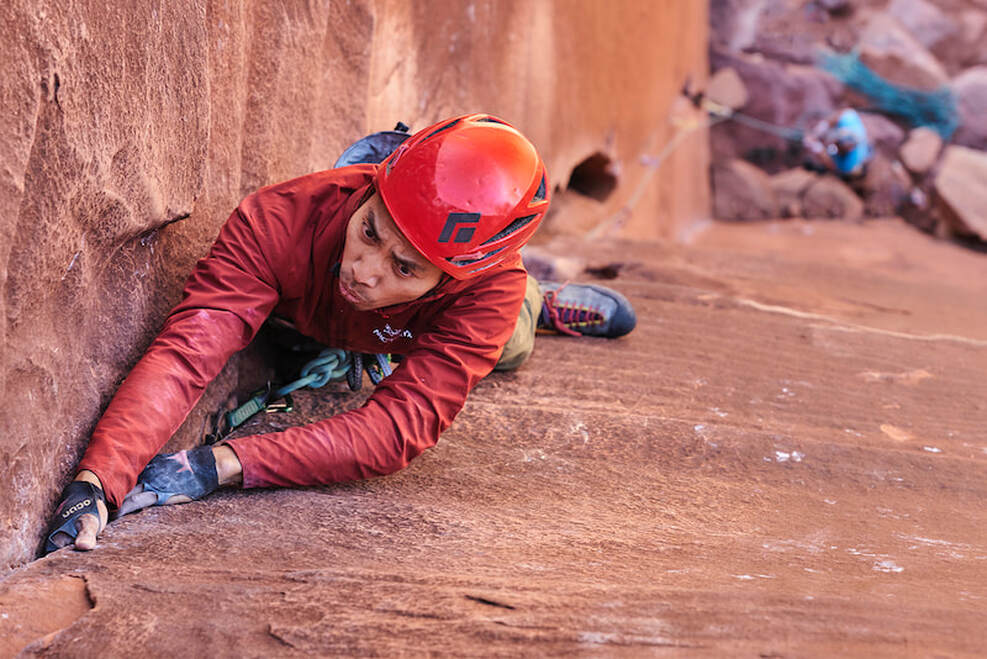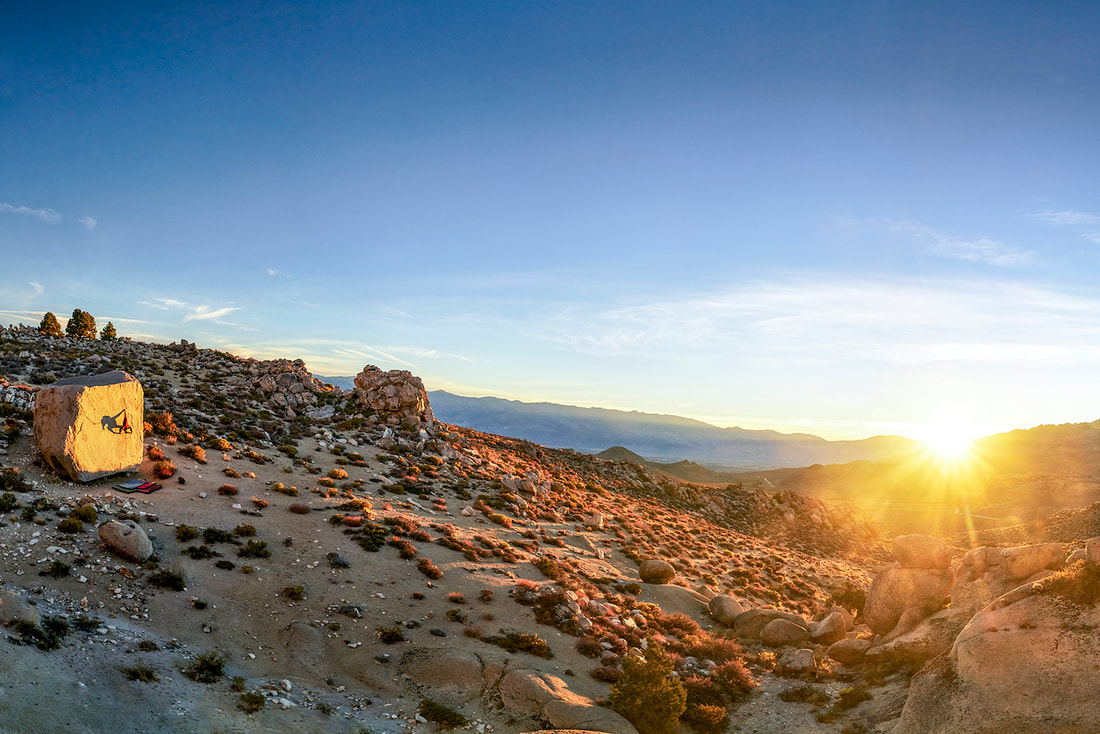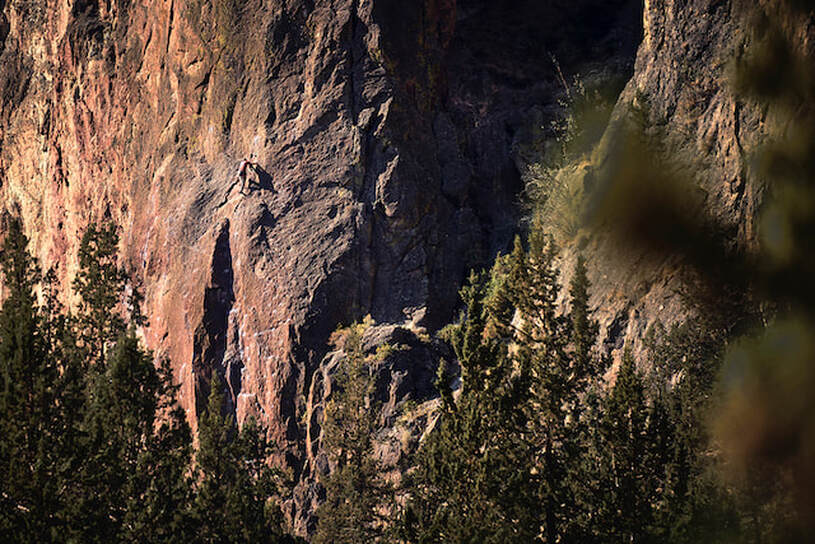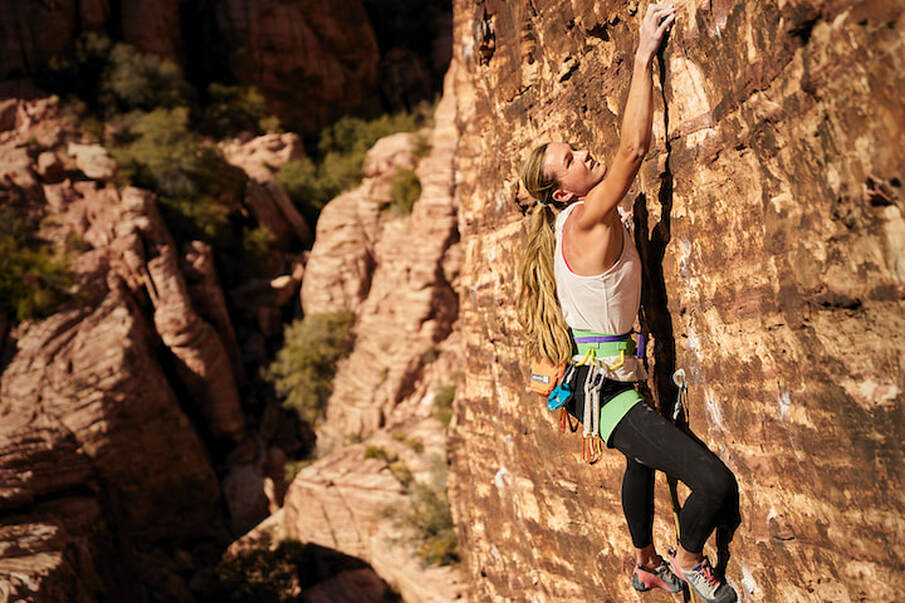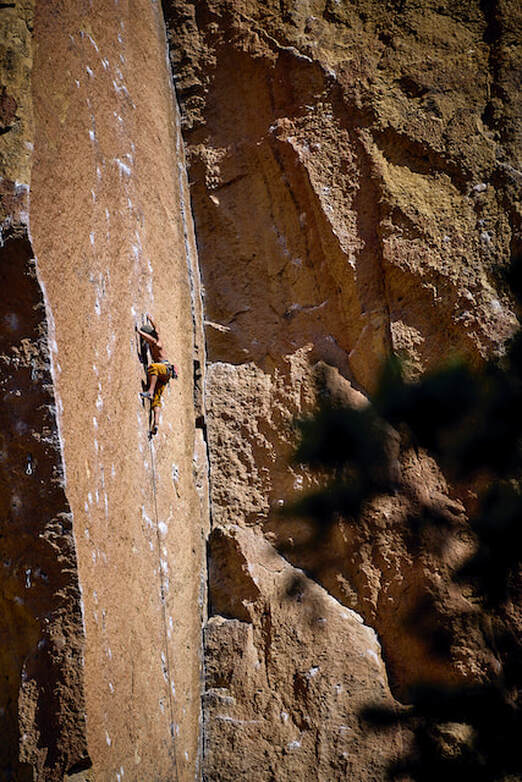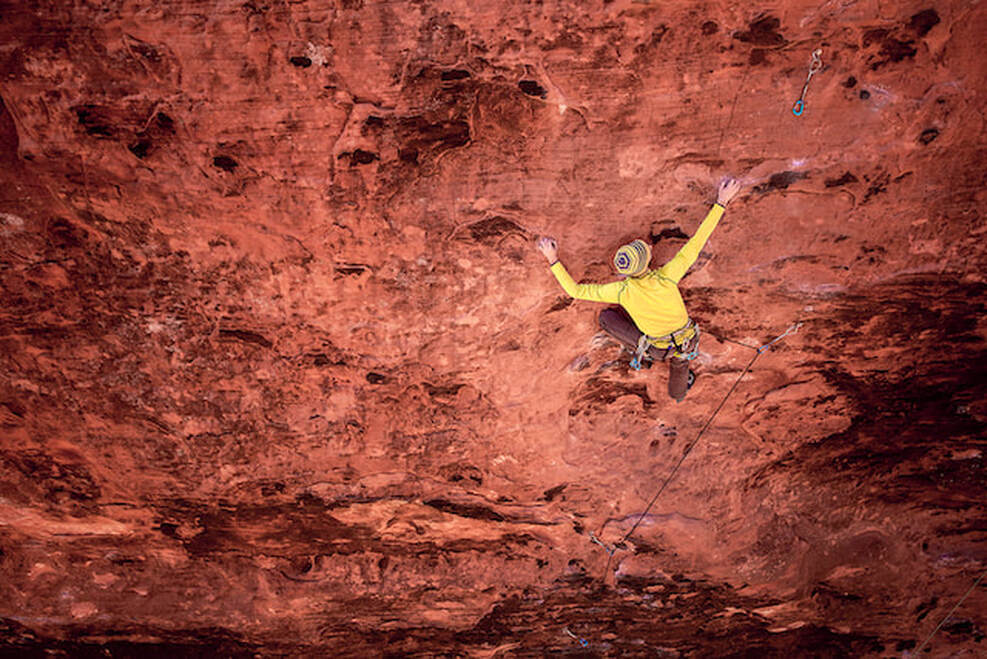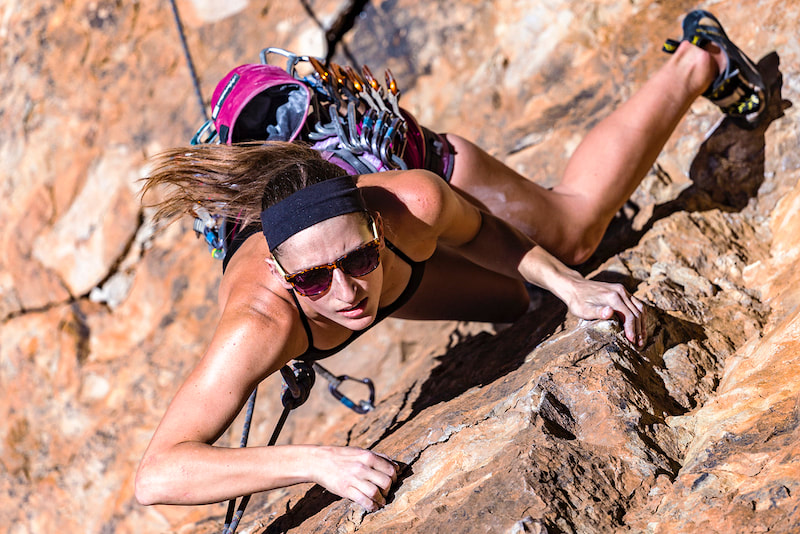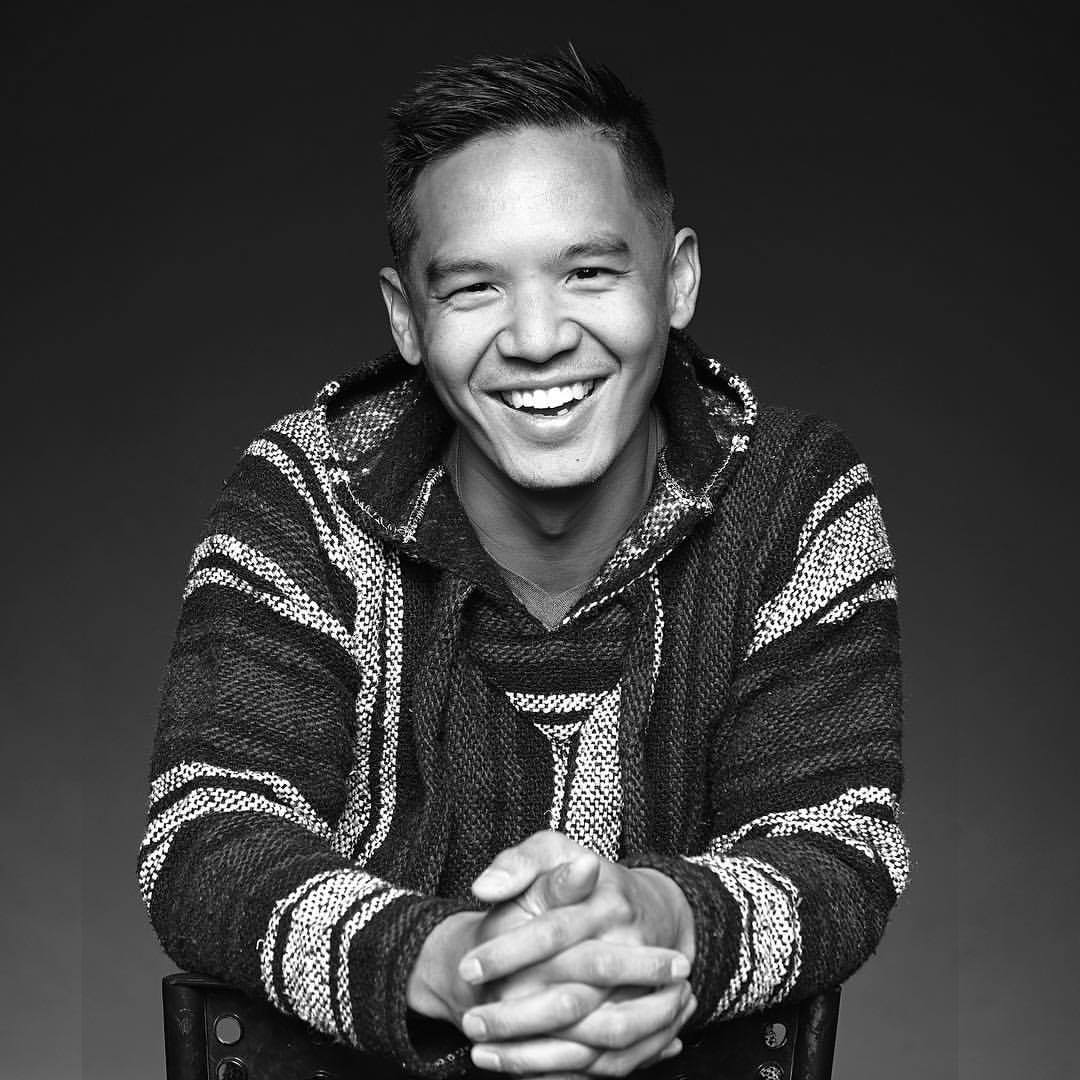Cover Photo by Bryan Sillorequez of Gerry Egbalic in Indian Creek, Utah
EDITOR'S NOTE: Bryan Sillorequez is the featured photographer for our themed edition of “Honoring Diversity." In addition to asking questions about climbing and photography, we ask specific questions on Bryan's experience with racism.
Your Instagram description says, “Just a brown guy living in his Subaru Crosstrek” – tell us more about this. You used to live in a van and now you are living in a Crosstrek?
Yeah, I've had some recent changes. I used to live in a van, and then my Crosstrek. It’s great when you’re on the road, traveling, and climbing all the time, but recently I moved back to San Francisco to work on my career. So, I have since settled in an apartment. When I moved back to California I continued to live out of my van for a few months, but found that I needed more amenities than my van could provide. I still have the van and my Crosstrek, but now I just use the van for weekend trips or smaller trips (7 to 10 day trip). I use my Crosstrek a lot more these days as it takes up less space, is more cost effective on gas, better on the environment, and I can also go on rougher roads. Given our current state of uncertainty, though, I am considering moving back into my van in a couple months - if I do then there may be no need to change my IG description!
Yeah, I've had some recent changes. I used to live in a van, and then my Crosstrek. It’s great when you’re on the road, traveling, and climbing all the time, but recently I moved back to San Francisco to work on my career. So, I have since settled in an apartment. When I moved back to California I continued to live out of my van for a few months, but found that I needed more amenities than my van could provide. I still have the van and my Crosstrek, but now I just use the van for weekend trips or smaller trips (7 to 10 day trip). I use my Crosstrek a lot more these days as it takes up less space, is more cost effective on gas, better on the environment, and I can also go on rougher roads. Given our current state of uncertainty, though, I am considering moving back into my van in a couple months - if I do then there may be no need to change my IG description!
Since this issue is about “Honoring Diversity” let’s talk about the “brown guy” bit. What is your racial/ethnic background?
I am ¾ Filipino and ¼ Japanese but as a ‘brown guy’ I get asked the questions ‘What are you?’ or ‘Where are you from?’ a lot. I find this offensive. It makes me feel like people are profiling me for who they think I am instead of who I am. I identify as an American. I like to repeat a quote from American Pastime - "I was born here just like you."
Where are you from originally? Where did you grow up and did you experience much racism as a child or as an adult?
I was born in the San Francisco Bay Area and grew up in Southern California in a town called Rancho Cucamonga (if you’ve seen Next Friday you will have heard of the town).
Racism has been an up and down slope as a child and as an adult.
I am the first generation of my family to be born in the United States and since my parents wanted me to live with less troubles and better opportunities, they believed that being Americanized was the way to go. I wasn’t raised with much of my Asian culture and I wasn’t raised to speak the language, all so that I would fit in with the American culture. This is part of Asian American conformity, where Asians, especially first generations and their parents, try to fit in. They believe that was a way for people to accept us for us.
Growing up, I can remember people calling me animal names, a monkey here, a chimp there, telling me "I’m the help" or that I "look like the help" (the latter half still persists today). Given that I grew up in a diverse area, I either ignored it or learned to deal with it, which shouldn’t have been the case, and was probably a part of that Asian conformity that I grew up to know.
As an adult I experience racism on a daily basis. I don’t know how to explain it well without sharing some of my experiences.
There is this term called ‘silent racism’ or ‘covert racism’ and ‘polite racism’ where people don’t realize that they are being racist. Or, maybe they are being racist and trying to play something off as not serious or as a joke. Or, actually being racist but trying to come across as friendly. I have had many experiences where I would be called Bruce Lee or Jackie Chan. I remember, when I first moved to New York to work for Annie Leibovitz, I lived in Harlem. Every time I walked down the street, people would call me over by saying something along the lines of, "Hey Jackie Chan, where are you going?" Leaving my apartment, I would hear all kinds of racial slurs.
I travel around the world for work and pleasure and I experience it there too.
In Nepal before doing the Everest Base Camp Trek, I was sitting in a restaurant and someone asked me where I was from. I replied I’m from America and that I am an American. Someone at the bar turned around almost immediately and told me, "You’re not American. You’re too dark to be American."
Another time I was in South Africa, and I went into a bar with a predominantly white crowd. There was another Asian guy there (the only one besides me) and people kept saying things like, "We found your brother." Or they would refer to us being related, pointing and trying to act like we were looking in a mirror. This still happens today, even in San Francisco.
I’ve been living in San Francisco on and off since 2004. San Francisco has a higher Asian population than most American cities, yet the racism still happens. One day when I was about 22 or 23 I was walking through Pacific Heights (a predominantly rich white neighborhood), a white man who was walking his dog saw me and called the cops. He told the cops that I was someone that broke into his house. I have never broken into any house, nor have I ever been in any house in this neighborhood.
Multiple cop cars stopped me a block away - blocking the middle of the road, backing me into a wall, and going through my backpack (it was the only thing on me which just carried a few resumes). I never thought something like this would happen in San Francisco, since it tends to be very forward thinking. When it happened to me I had to re-evaluate how I view racism.
I may have been quite naive then, thinking that as an Asian male, I’d be ok. Ironically, there has been a recent story of another Filipino man who got the cops called on him in the same neighborhood while writing BLM (Black Lives Matter) on his own property. That story hit hard since I experienced racism first hand, in the same neighborhood.
Even a few months ago, I was talking to a non-person of color (POC) at the local climbing gym about how racism against Asians is a problem. He responded with, "You act like you’re black," brushing off my experiences and what is actually happening around him.
When it comes to experiencing racism, I do experience it on a daily basis and have become more aware of it in everything that I do.
I was born in the San Francisco Bay Area and grew up in Southern California in a town called Rancho Cucamonga (if you’ve seen Next Friday you will have heard of the town).
Racism has been an up and down slope as a child and as an adult.
I am the first generation of my family to be born in the United States and since my parents wanted me to live with less troubles and better opportunities, they believed that being Americanized was the way to go. I wasn’t raised with much of my Asian culture and I wasn’t raised to speak the language, all so that I would fit in with the American culture. This is part of Asian American conformity, where Asians, especially first generations and their parents, try to fit in. They believe that was a way for people to accept us for us.
Growing up, I can remember people calling me animal names, a monkey here, a chimp there, telling me "I’m the help" or that I "look like the help" (the latter half still persists today). Given that I grew up in a diverse area, I either ignored it or learned to deal with it, which shouldn’t have been the case, and was probably a part of that Asian conformity that I grew up to know.
As an adult I experience racism on a daily basis. I don’t know how to explain it well without sharing some of my experiences.
There is this term called ‘silent racism’ or ‘covert racism’ and ‘polite racism’ where people don’t realize that they are being racist. Or, maybe they are being racist and trying to play something off as not serious or as a joke. Or, actually being racist but trying to come across as friendly. I have had many experiences where I would be called Bruce Lee or Jackie Chan. I remember, when I first moved to New York to work for Annie Leibovitz, I lived in Harlem. Every time I walked down the street, people would call me over by saying something along the lines of, "Hey Jackie Chan, where are you going?" Leaving my apartment, I would hear all kinds of racial slurs.
I travel around the world for work and pleasure and I experience it there too.
In Nepal before doing the Everest Base Camp Trek, I was sitting in a restaurant and someone asked me where I was from. I replied I’m from America and that I am an American. Someone at the bar turned around almost immediately and told me, "You’re not American. You’re too dark to be American."
Another time I was in South Africa, and I went into a bar with a predominantly white crowd. There was another Asian guy there (the only one besides me) and people kept saying things like, "We found your brother." Or they would refer to us being related, pointing and trying to act like we were looking in a mirror. This still happens today, even in San Francisco.
I’ve been living in San Francisco on and off since 2004. San Francisco has a higher Asian population than most American cities, yet the racism still happens. One day when I was about 22 or 23 I was walking through Pacific Heights (a predominantly rich white neighborhood), a white man who was walking his dog saw me and called the cops. He told the cops that I was someone that broke into his house. I have never broken into any house, nor have I ever been in any house in this neighborhood.
Multiple cop cars stopped me a block away - blocking the middle of the road, backing me into a wall, and going through my backpack (it was the only thing on me which just carried a few resumes). I never thought something like this would happen in San Francisco, since it tends to be very forward thinking. When it happened to me I had to re-evaluate how I view racism.
I may have been quite naive then, thinking that as an Asian male, I’d be ok. Ironically, there has been a recent story of another Filipino man who got the cops called on him in the same neighborhood while writing BLM (Black Lives Matter) on his own property. That story hit hard since I experienced racism first hand, in the same neighborhood.
Even a few months ago, I was talking to a non-person of color (POC) at the local climbing gym about how racism against Asians is a problem. He responded with, "You act like you’re black," brushing off my experiences and what is actually happening around him.
When it comes to experiencing racism, I do experience it on a daily basis and have become more aware of it in everything that I do.
What about climbing? When did you catch the bug and what’s your favorite style of climbing?
I started climbing January 2, 2011. I'm nearing 10 years of being in love with climbing. Regarding my favorite style, I personally like to gain lots of vert, so I would say trad, but I also like to push hard on sport climbs. If there’s a rope involved, I would prefer it over a pad any day.
Have you experienced racism within or from the climbing community?
I feel the climbing community, overall, is aware of racism, but it still happens (like the above example in the gym.) There are many times I am at crags and people call me "the Asian guy" when there are many other Asian guys around. People will also make comments, sometimes joking (that covert racism I described) about how Asian people look the same. I try to correct this when it happens, but I do get pushed into this category where we are all considered the same.
In certain climbing locations racism can be an issue. I went to climb Mt. Shasta with my friend Darrick, who is black. Before our climb we went to a restaurant in town. The moment we walked in, everyone stopped and looked at us. Whether or not they meant stare or whether they purposefully intended to make us feel uncomfortable, it is still quite eerie when everyone stops just to look at you. Some communities like these may not be used to seeing POC, especially climbers of color.
What do you think of representation in climbing and/or climbing photography?
The representation of POC in climbing and climbing photography is few and far between. Over the last 10 years, I have seen more and more representation for POC in the climbing community and I think it’s great. I have many friends that have their own POC groups and trying to bring more awareness around the issue, but I think it is still an uphill battle.
More companies are trying to be inclusive and adding POC to advertisements and trying to acknowledge that the sport isn’t just for one group of people.
As for photography and photographers, there are plenty of climbing photographers out there, but I think when it comes to diversity, I don’t think that POC are well represented in photography - both as photographers and as subjects in the photo. I’ll open a magazine and maybe see one POC, if that, out of the whole magazine including the advertisements.
I also find that many of the competitive climbing teams and climbing brand representatives lack diversity. Maybe there are one or two people here or there, but if we compare ourselves to the rest of the world and other teams at climbing competitions, our teams have yet to represent POC well.
|
Tell us about your career in photography. How long have you been doing it? What’s it like being a professional photographer?
I have been a photographer for 5 years. I love my work and enjoy creating things. Being a professional photographer is difficult, though, because nowadays cameras are inexpensive and everyone claims to be a photographer. Finding jobs is challenging because clients are always trying to find the cheapest photographer, not necessarily focusing on quality. My email is filled with, "Found someone new to the industry and willing to do it for cheaper" rejections. I also have emails that say, "You don’t have enough Instagram followers to work for us." This makes it extremely difficult because as a professional you are being compared by the number of followers and not by the quality of your work. What’s photographing climbing like compared to other photography you do? Photographing climbing is a lot more work than other forms of photography. It requires more energy to carry your gear, set up lines, and then hang for quite a lot of time. When I’m in a studio, I have time to work on a photo, look at a computer, then make edits as I go along. I can also grab drinks, snacks, and use the restroom whenever I want. You can't easily do those things when photographing climbing. On the flip side, though, when photographing climbing I'm outside - I love being outdoors more than anything. |
Do you have a favorite place to climb? Do you have a favorite place to photograph climbing?
As a Californian, I've had a love for Yosemite my whole life. When I started climbing, Yosemite opened so many possibilities to explore. It's beautiful there. I love the smell of the trees and seeing and hearing the running water. I also love how you can go into the backcountry and be away from the rest of the world.
I don’t have a favorite place to photograph climbing. For me it's more about the people and making memories of an experience. If I had to choose between place or people, its the people that make the images.
You also do “motion graphics,” tell us a bit about that.
When I moved back to San Francisco, my friends who are motion graphics artists, knew of my photoshop and digital background. They thought that I could easily learn motion graphics. and have a side hustle. l I dove into it and I found it to be very similar to my work in photography. I was able to expand my skillset and find extra work when I am not out making photographs.
What are your goals/visions for your photography? And climbing?
I would love to keep bringing my climbing and photography together. Being in the outdoors is important to me and climbing photography provides that. So does photography in the Outdoor Industry, so I'd love to get more jobs doing that line of work. I'd also like to work towards increasing representation and diversity of POC in the photography world. I'd like to see a time where you can ask a climber to name three well-known climbing photographers that are POC.
My climbing goal is to get back to climbing in the 5.13 range. It’s been almost 4 years maybe 5 since I got my first 5.13a. I’ve been teetering on 5.12d (sport) for a while now and I was planning on breaking 5.13 again this spring, but unfortunately our current circumstances with COVID are limiting. I also want to break into 5.12a trad and improve my tiny crack technique.
I would love to keep bringing my climbing and photography together. Being in the outdoors is important to me and climbing photography provides that. So does photography in the Outdoor Industry, so I'd love to get more jobs doing that line of work. I'd also like to work towards increasing representation and diversity of POC in the photography world. I'd like to see a time where you can ask a climber to name three well-known climbing photographers that are POC.
My climbing goal is to get back to climbing in the 5.13 range. It’s been almost 4 years maybe 5 since I got my first 5.13a. I’ve been teetering on 5.12d (sport) for a while now and I was planning on breaking 5.13 again this spring, but unfortunately our current circumstances with COVID are limiting. I also want to break into 5.12a trad and improve my tiny crack technique.
Is there anything else you would like to share with us?
There's a lot to learn about diversity and what can be done to improve the world around us. There’s only one world and if we don’t take care of each other, we’ll destroy ourselves. We need to listen to each other. We need to not discount people's experiences. And, we need to take the time to personally reflect upon and evaluate ourselves. In the end, we are in control of the changes we make in our own lives and in the world.
There's a lot to learn about diversity and what can be done to improve the world around us. There’s only one world and if we don’t take care of each other, we’ll destroy ourselves. We need to listen to each other. We need to not discount people's experiences. And, we need to take the time to personally reflect upon and evaluate ourselves. In the end, we are in control of the changes we make in our own lives and in the world.
|
CONTACT BRYAN SILLOREQUEZ
INSTAGRAM: @bvs.photo WEBSITE ADDRESS: http://bryan.sillorequez.com EMAIL: [email protected] |

